Israeli-Owned Oil Tanker Attacked By Drone Off Gulf Of Oman
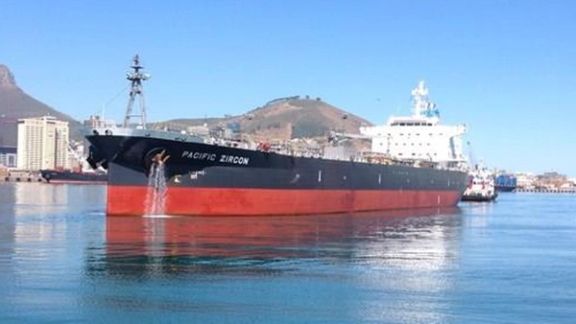
The US Navy's Fifth Fleet says a commercial vessel has been struck off the Gulf of Oman, while reports indicate the vessel’s owner is an Israeli.

The US Navy's Fifth Fleet says a commercial vessel has been struck off the Gulf of Oman, while reports indicate the vessel’s owner is an Israeli.
The Associated Press cited a defense official as saying that a Liberian-flagged oil tanker was hit and exploded in a drone attack Tuesday night.
Commander Timothy Hawkins said Wednesday the tanker was operated by the Singapore-based Eastern Pacific Shipping, a company AP said was ultimately owned by Israeli billionaire Idan Ofer.
The shipping firm says the attack dealt minor damage to the tanker, causing no injuries or spillage.
According to shipping tracking site MarineTraffic, the tanker, Pacific Zircon, was last seen off the coast of Liwa, Oman on Monday morning. It departed from Sohar, Oman Monday afternoon with its destination set as the port of Buenos Aires, Argentina.
While no one immediately claimed responsibility for the attack, suspicion immediately fell on Iran.
Tehran and Israel have been engaged in a yearslong shadow war in the wider Middle East, with some drone attacks targeting Israeli-associated vessels traveling around the region.
Last July, Iran targeted the Mercer Street oil tanker with drones. One drone slammed into the bridge of the ship, killing two members of the crew.
Mercer Street was operated by London-based Zodiac Maritime, part of Israeli Zodiac Group owned by Eyal Ofer.
In the spring of 2021, there were also several incidents involving attacks on ships, including the Helios Ray in February and the Hyperion Ray in April.

Georgia’s security officials said Tuesday they have foiled an Iranian plot to assassinate an Israeli citizen on their soil.
The murder had been planned by Iran’s Revolutionary Guard Quds Force which conducts overseas operations of the IRGC.
The plan was to kill Itzik Moshe, a businessman who worked to advance Israel-Georgia ties.
The State Security Service of Georgia released a statement on Tuesday saying the man planning the attack has been arrested, and the one who apparently ordered the murder is identified as an Iranian national working outside Georgia.
The security agency also said several people were arrested in the course of the investigation, including Georgians who held dual citizenship with Iran or Pakistan.
Dual Iranian-Georgian citizens residing in Georgia delivered weapons to a Pakistani hit man without meeting him directly; rather, they used hiding places for the weapon transfer, added the statement.
The news from Georgia came months after Israeli and Turkish intelligence agencies worked together to stop an Iranian plot to assassinate Israeli tourists in Istanbul. Jerusalem warned Israelis not to visit Turkey in June, and soon after, Turkey arrested eight members of an Iranian cell in hotel rooms in a popular tourist district, with weapons and ammunition.
Last October, Cyprus foiled an Iranian plot to attack Israelis, including billionaire Teddy Sagi, which Tehran denied. Cypriot authorities arrested a Russian-Azeri man who had a loaded pistol with a silencer in his rented car.
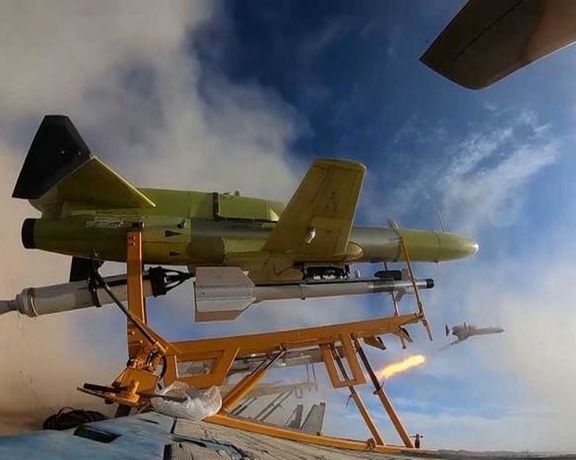
Washington Tuesday imposed sanctions on companies and people it accused of being involved in the production or transfer of Iranian drones that have been used by Russia in attacks on civilian infrastructure in Ukraine.
Russia has procured drones from Iran that have been used to attack cities and power infrastructure in Ukraine.
Iran has acknowledged that it had supplied Moscow with drones but said they were sent before the war in Ukraine.
"As we have demonstrated repeatedly, the United States is determined to sanction people and companies, no matter where they are located, that support Russia's unjustified invasion of Ukraine," Treasury Secretary Janet Yellen said in the statement.
"Today's action exposes and holds accountable companies and individuals that have enabled Russia's use of Iranian-built UAVs to brutalize Ukrainian civilians," she said.
The US Treasury Department, in a statement, said it imposed sanctions on the Shahed Aviation Industries Research Center, which it said was subordinate to Iran's Revolutionary Guard Corps (IRGC) Aerospace Force, accusing the firm of being responsible for the design and production of Shahed-series drones being used by Russian forces in Ukraine.
Also designated were United Arab Emirates air transportation firms Success Aviation Services FZC and iJet Global DMCC, which the Treasury accused of collaborating with an Iranian firm under US sanctions to coordinate flights between Iran and Russia, including those tied to transporting Iranian drones.
Treasury said the action against the two companies was taken in cooperation with the government of the United Arab Emirates.
Tuesday's move freezes any US assets of those designated and generally bars Americans from dealing with them.
Reuters report

Remarks from United States special Iran envoy Rob Malley Monday signaled Washington no longer sees Iran’s nuclear program as separable from other issues.
Speaking to reporters in Paris, Malley appeared to jettison the logic of the 2015 Iran nuclear agreement, which restricted Tehran’s atomic program in return for the easing of international sanctions. Eighteen-month talks to revive the agreement, from which former president Trump withdrew the US in 2018, have come to naught.
“Our focus is not an accord that isn’t moving forward, but what is happening in Iran ... this popular movement and the brutal crackdown of the regime against protesters,” Malley said. “It’s the sale of armed drones by Iran to Russia ... and the liberation of our hostages…” At least three American nationals are detained in Iran, with talks for a prisoner swap inconclusive.
Malley reiterated Washington’s view that the talks to revive the 2015 agreement, the JCPOA (Joint Comprehensive Plan of Action), had floundered because of both “Iran’s position,” in making demands the US considers beyond the JCPOA, and “everything that has happened since [September].” Recent protests in Iran followed the September 16 death of Mahsa Amini after detention by Tehran ‘morality police.’
President Joe Biden came to office in 2021 committed to reviving the JCPOA as a non-proliferation agreement and thereby lifting the ‘maximum pressure’ sanctions introduced by Trump. But Biden’s administration has extended sanctions, citing both Tehran’s military links with Russia and its treatment of protestors.
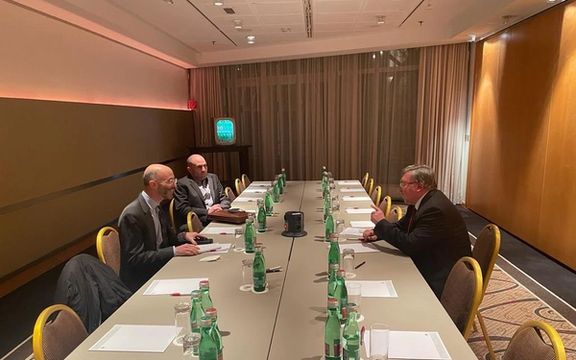
Since 2019, the year after the US left the JCPOA, Iran has in response gradually extended its nuclear program and according to the latest report from the International Atomic Energy Agency (IAEA) has now 3,674kg of enriched uranium. This is far above the 267kg JCPOA limit, and includes 62kg enriched to 60 percent, a short step from the 90 percent considered ‘weapons grade.’
Under the JCPOA Iran enriched only to 3.67 percent. Under the JCPOA it employed only 6,104 first-generation centrifuges whereas it now additionally uses at least 4,000 more advanced centrifuges that were banned under the 2015 agreement.
‘No magic…new formula’
Malley said Monday the US would discuss with its “European allies” what steps to take should Iran continue to expand nuclear activities. “If Iran takes the initiative to cross new thresholds in its nuclear program, then obviously the response will be different and coordinated with our European allies…There is no magic in which we will find a new formula.”
With Benjamin Netanyahu set to return to office and the outgoing Israeli administration suggesting it had thoroughly prepared for a military attack on Iran, both the United Arab Emirates (UAE) and Saudi Arabia show concern over rising tensions. While Central Intelligence Agency director William Burns Monday met the head of Russian foreign intelligence Sergey Naryshkin in Ankara to discuss ‘risk management,’ there has been speculation that Moscow has decided to supply Iran with Su-35 fighter jets.
Anwar Gargash, diplomatic adviser to UAE President Mohamed bin Zayed Al Nahyan, said Monday the Emirates had no interest in “choosing sides” between competing powers. Gargash said that while the UAE wanted “codified and unambivalent commitments” from the US, it hoped to see effort put into easing strains and encouraging economic growth without relying on “just one or two countries.”
Both the UAE and Saudi Arabia are expanding trade with China, while Riyadh has led coordination through Opec+ with Russia over oil production levels. The UAE has stepped back from involvement in violent conflict in Yemen and Libya, and earlier this year restored full diplomatic relations with Iran after a six-year gap. While the UAE in 2020 ‘normalized’ relations with Israel, Saudi Arabia so far has maintained the Arab League position that this requires Israeli recognition of Palestinian statehood.
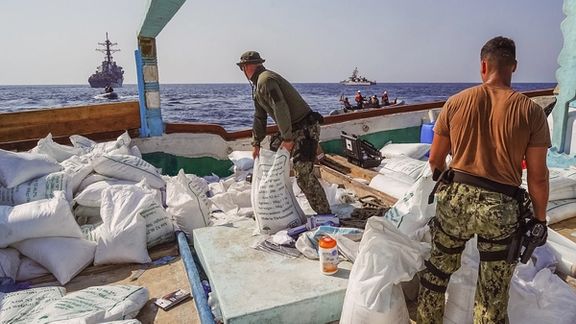
The US Navy says it intercepted a fishing vessel in waters near Iran that was smuggling “massive” amounts of explosives.
This ship was transiting from Iran along a route in the Gulf of Oman that has been used to traffic weapons to Yemen's Houthi group, reported Reuters.
Releasing a statement on Tuesday, US Navy's Fifth Fleet said its forces found over 70 tons of ammonium perchlorate on the vessel that is generally used to make rocket and missile fuel, as well as explosives.
“This was a massive amount of explosive material, enough to fuel more than a dozen medium-range ballistic missiles depending on the size,” said Vice Admiral Brad Cooper, commander of US Naval Forces Central Command, US 5th Fleet and Combined Maritime Forces.
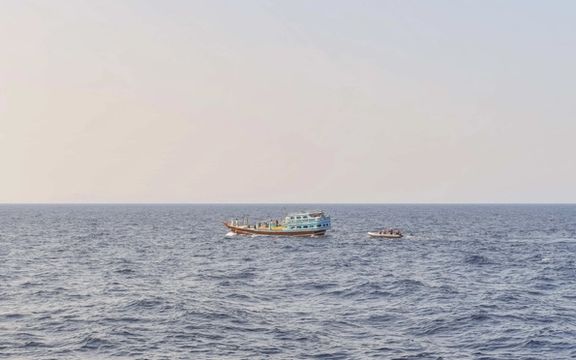
A Saudi-led military coalition battling the Iran-aligned Houthis in Yemen since 2015 has repeatedly accused Tehran of supplying weapons to the group, but the Islamic Republic denies the accusation.
The Islamic Republic has not commented on the accusation yet.
The Fifth Fleet further noted that four Yemeni crew were onboard the vessel which was also carrying 100 tons of urea fertilizer that is used in agriculture but also for making explosives.
US forces sank the ship on Sunday in the Gulf of Oman as it was a "hazard to navigation for commercial shipping" and its crew were handed over to the Yemen coast guard, it added.
Last December, the Fifth Fleet seized a shipment of rifles and ammunitions from a fishing boat. It announced that the cargo is believed to be sent by the Islamic Republic for the Houthis.
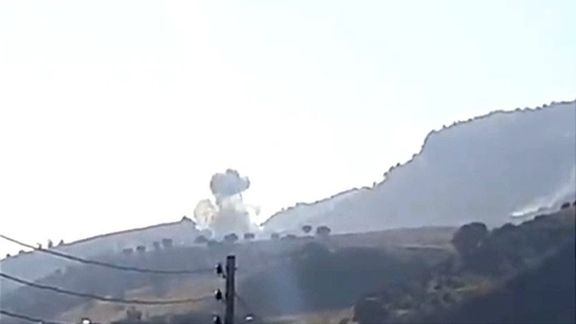
Iran’s Revolutionary Guard’s latest round of shelling of Iraqi Kurdistan region has drawn condemnation by Western countries as well as the Iraqi government.
In a Monday phone call with his Iranian counterpart Hossein Amir-Abdollahian, Iraqi Foreign Minister Fuad Hussein decried the attacks as a violation of Iraq's sovereignty, saying that the continuation of such unilateral measures is "dangerous".
Moreover, Kurdistan Region Prime Minister Masrour Barzani also condemned the “violations” of Iraq and its Kurdish region’s sovereignty, following IRGC’s attacks on the headquarters of Iranian-Kurdish groups, some of which are armed.
According to Iran International’s correspondent, the RGC targeted the main base of the Democratic Party of Iranian Kurdistan (PDKI) in capital Erbil and Komala in Sulaymaniyah with drones and missiles.
The PDKI said a senior party member and a Peshmerga militiaman were killed and several other Peshmerga forces injured in the Monday attacks.
The Canadian Embassy in Iraq, the US Consulate General in Erbil, the UN Assistance Mission for Iraq (UNAMI) and the German Consulate General in Erbil have so far condemned the renewed attacks on the Kurdistan Region.
The German Consulate-General in Erbil said that Berlin urges Iran to respect the territorial integrity and sovereignty of Iraq. “The attacks have to stop immediately,” it said.
Since the current wave of protests began in Iran following the death in custody of young Iranian Kurdish woman Mahsa (Jina) Amini, the Islamic Republic has intensified its attacks on Kurdish dissident groups based in Iraqi Kurdistan, apparently aimed at intimidating the Kurds. In addition to PDKI and Komala, IRGC launched artillery and suicide drone attacks against positions of other Kurdish groups opposed to the Islamic Republic such as Parti Azadi Kurdistan, aka PAK (Kurdistan Freedom Party).
The US also strongly condemned Iran’s “violations of Iraqi sovereignty”, calling on the Islamic Republic to stop attacking its neighbor and the people of Iraq. “We stand with the Iraqi government’s leaders in Baghdad and the Iraqi Kurdistan region,” the Consulate General in Erbil said on its twitter account.
“Iraq should not be used as an arena to settle scores and its territorial integrity must be respected,” UN Assistance Mission for Iraq said, adding that “Dialogue between Iraq and Iran over mutual security concerns is the only way forward.”
Amini was from the Kurdish town of Saqqez and was arrested and beaten during a visit to Tehran. After her death in hospital, her hometown and other Kurdish cities were the first to launch antigovernment protests.
Late in October, the Iranian Army's Ground Force also launched a three-day war game around the northwestern town of Piranshahr in West Azarbaijan province bordering Iraqi Kurdistan.
Iran’s last barrage of missile and drone strikes against the groups in September led to the death of 14 people, including women and children, and wounding of 58 other people near Erbil and Sulaymaniyah.
The Islamic Republic calls the Kurdish armed groups in the western provinces of Iran, "terrorist groups" or "anti-revolutionary" but these groups say that the goal of their armed campaign is "defending the rights of the Kurds".
Generally, the Kurdish parties − including Komala and the KDPI − favor Kurdish autonomy within a federal Iran.